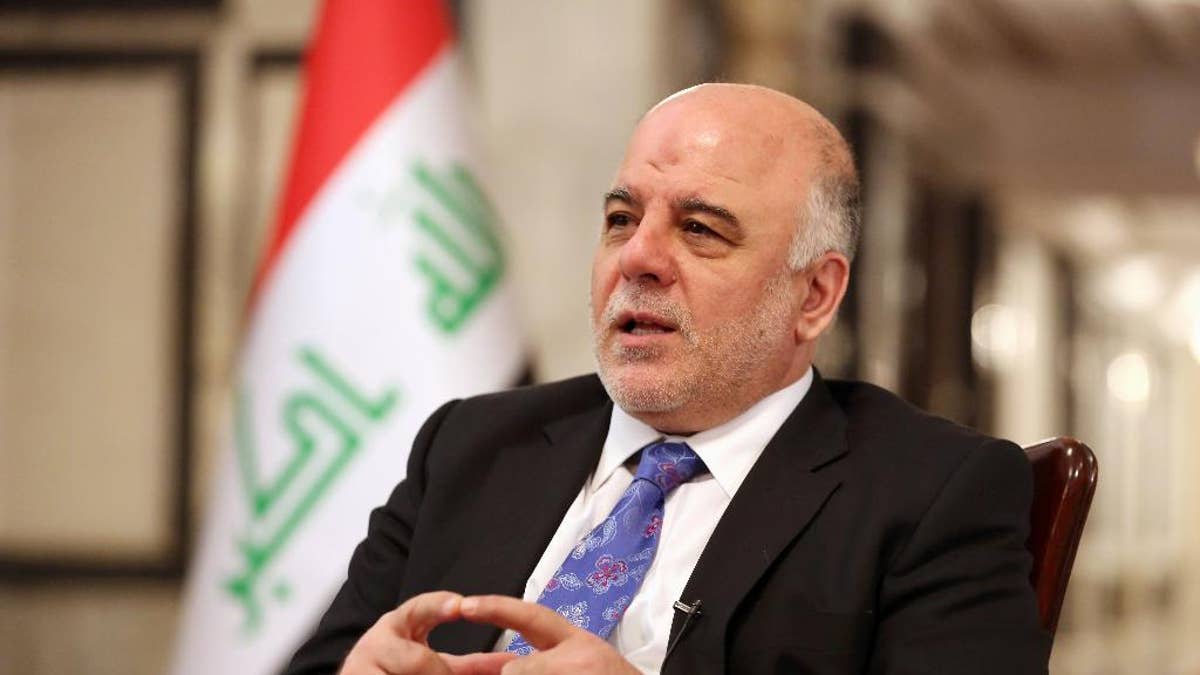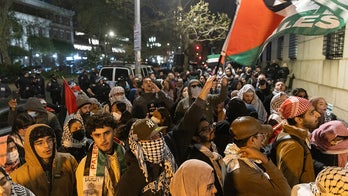
Iraq's Prime Minister Haider al-Abadi speaks during an interview with The Associated Press in Baghdad, Iraq, Wednesday, Sept. 17, 2014. Iraq’s new prime minister says foreign ground troops are neither necessary nor wanted in his country’s fight against the Islamic State group. (AP Photo/Hadi Mizban) (The Associated Press)
Defense Secretary Ash Carter gave his support to Iraq's embattled prime minister Haider al-Abadi, telling reporters the Iraqi leader "seems to be in a very strong position" despite anti-government protests that saw protesters storm Baghdad's heavily fortified Green Zone over the weekend.
"Prime Minister Abadi stands for and has been a partner in all of the things that are important to Iraq's future," Carter said Monday. "He's had considerable success on the battlefield, obviously Ramadi, Hit, and so forth."
U.S. airstrikes helped Iraqi troops clear Islamic State fighters out of wartorn Ramadi in early-January.
But on Saturday, hundreds of supporters of Shiite cleric Muqtada al-Sadr tore down walls and poured into the zone that is home to the seat of the Iraqi government and most foreign embassies. Loudspeaker announcements on Sunday evening urged protesters to leave peacefully. When the call came, hundreds calmly packed up and left, carrying flags and overnight bags away with them.
Carter spoke on his way to a series of counter-ISIS meetings with European counterparts in Germany. He also said NATO was considering a move to add more troops in Eastern Europe, on top of the armored brigade the Pentagon announced it was sending in late March. "There are discussions going on within NATO about how others can do the same thing," he added.
The Green Zone, surrounded by thick blast walls topped with razor wire, is off-limits to most Iraqis because of security procedures that require multiple checks and specific documentation to enter. It has long been the focus of al-Sadr's criticism that the government is detached from the people.
Supporters of al-Sadr have been holding demonstrations and sit-ins for months to demand an overhaul of the political system put in place by the U.S. after the overthrow of Saddam Hussein in 2003. Last summer, demonstrations demanding better government services mobilized millions across Iraq and pressured al-Abadi to submit his first package of reform proposals. However, months of stalled progress followed, and in recent months al-Sadr's well organized supporters took over the protest movement.
Despite the subdued end to the latest protest, Iraqi officials fear the precedent set by the Green Zone breach will continue to undermine the country's security.
While ISIS has suffered a number of territorial defeats in the past year, the group still controls significant pockets of territory in Iraq's north and west, including the country's second largest city of Mosul, estimated to still be home to more than 1 million civilians.
Al-Sadr's office in Baghdad denied that the demonstration was jeopardizing the fight against ISIS, but conceded that the decision to disband Sunday was made partly for security reasons.
Organizers decided to end the protest now because of an annual Shiite pilgrimage to the shrine of an eighth century imam in Baghdad that is expected to attract thousands from across the country, said Sadiq al-Hashemi, a representative of al-Sadr's office in Baghdad who was present at the protests.
The protests will resume after the pilgrimage ends this week, al-Hashemi said, adding that the al-Sadr movement would also give Iraqi lawmakers one more chance to vote in new reforms.
"We have achieved something here. We got our message out from the Iraqi street," Al-Hashemi said.
But lawmakers and Iraqi security officials say Sadr's show of force is undermining the country's leadership at a critical time and sets a dangerous precedent.
"They could just do it again," said lawmaker Hanan al-Fatlawi, referring to the Green Zone breach. "This is not a real solution. They showed no respect for the rule of law."
Fox News' Lucas Tomlinson and The Associated Press contributed to this report.




